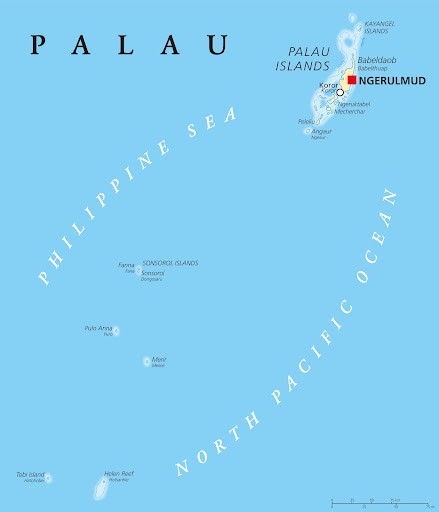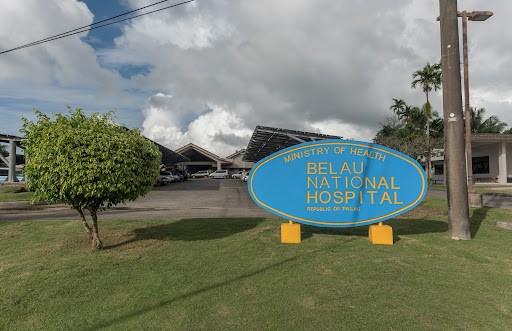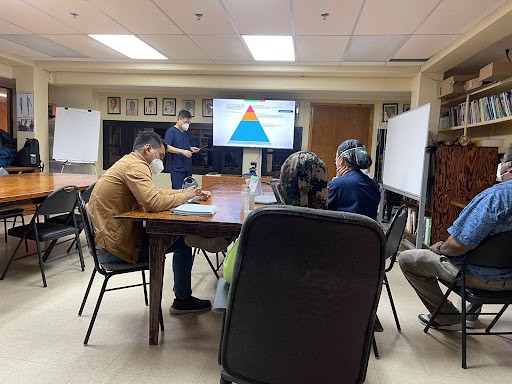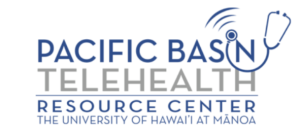Republic of Palau Resources
An overview of telehealth resources available in the Republic of Palau
Region Overview
The Republic of Palau (Belau) is a sovereign country located in the western most part of the Pacific Region. The country obtained its full sovereignty in 1994 when it signed a Compact of Free Association with the United States of America. This came about after a long history of foreign rule from Spain (1885-1898), Germany (1898 – 1914), Japan (1914 – 1944), USA (1944-1946), USA as part of the Trust Territory of the Pacific Islands (1947 – 1994). As part of the Compact of Free Association with the United States, Palauan citizens are able to travel, attend school and work freely in the US without visa requirements.
The Palau archipelago is about 2,960 nautical miles to the southwest of Hawaiʻi, and about 916 nautical miles east of the Philippines. Palau consists of a group of inhabited islands with Babeldaob island as the largest, and several smaller islands (Koror, Peleliu, Angaur), a coral atoll (Kayangel) in the northernmost part of the archipelago, as well as Southwest Islands of Hatohobei and Sonsorol (about 375 miles) from the main island of Babeldaob. In addition there are hundreds of uninhabited coral rock islands (about 200) scattered to the southwest of the main island of Babeldaob and Koror.
The total population of the Republic of Palau as of the 2015 Census was 17,661. More than two-thirds of the population reside in the 22 square mile island of Koror according to the 2020 Statistical Yearbook (PDF) published by the Republic of Palau Bureau of Budget and Planning, Ministry of Finance. Since 2005, there has been a steady decrease in the population which is attributed to low fertility rate and out migration.

Health Ecosystem
The Republic of Palau has both public and private health care providers and clinics. The Ministry of Health and Human Services oversees and provides clinical and social services. The MHHS oversees the Belau National Hospital (public hospital), and Public Health Services including Primary and Preventative Services, Oral Health Services, Environmental Health, Behavioral Health, and Epidemiology. In addition, there are ten (10) Community Health Centers that provide limited medical care located throughout Palau.

There are four (4) private health clinics in Palau that provide medical, optical, dental, pharmaceutical, and wellness care to the community. There is one separate private pharmaceutical clinic:
- Belau Medical Clinic (medical and pharmaceutical services),
- Family Surgical Clinic (medical services),
- Pacific Family Medical Supply (medical, optical, pharmaceutical services),
- Palau Adventist Wellness Center (dental and wellness care)
- PacifikaMed Pharmacy (pharmaceutical services)
A small US military Civil Action Team (CAT) located in the island of Babeldaob provides limited medical services and support to the community.
Health System
Mixed public + private
Health Insurance
National Health Insurance
- Private
- Medicaid for COFA migrants (in US)
Hospitals
Belau National Hospital (Public)
Health Centers
Public – 10 Palau locations:
1. Koror Central CHC
2. Koror Out-patient Department
3. Ngarchelong CHC
4. Eastern CHC
5. Western CHC
6. Central CHC 2 (Airai)
7. Kayangel CHC
8. Southern (Peleliu) CHC
9. Angaur CHC
10. Southwest Islands CHC
3 private medical clinics (2 with Pharmacies, 1 ophthalmology)
1 dental and wellness center
1 separate pharmacy
The Republic of Palau National Healthcare Financing Act of 2010 established the National Healthcare Fund, a healthcare funding mechanism (Medical Savings Fund) that would receive mandatory contributions by employers, employees, and self-employed. The fund contributions are invested, and fund the National Health Insurance that pays for in-patient (both public and private clinics) and off-island referrals, and the individual (covers medical checkups and out-patient services), and individual Medical Savings Accounts (MSAs) that pays for outpatient care, and other costs. The Social Security Administration of the Republic of Palau currently administers the Medical Savings Fund and the Palau Health Insurance with oversight from the National Healthcare Governing Committee. There are two (2) private insurance companies in Palau that provide medical insurance coverage plans.
Non-communicable diseases (NCDs) are the most pressing health issue for all USAPIs. In 2010, the Pacific Island Health Officers Association (PIHOA) declared a regional state of emergency due to NCDs in the region. The leading NCD contributors to morbidity and mortality are cardiovascular disease, diabetes, and cancer. The Disease Control Priorities 3rd Edition (2015), reports that cancer is now the second most common cause of mortality in most of the USAPI jurisdictions. To further put this in perspective, the incidence of cervical cancer in Micronesia is over eight times higher than the US (79.7 per 100,000 compared to 9.9 per 100,000). The region also has among the highest prevalence of obesity in the world, with some communities reporting as high as 90% prevalence among adults. About 83% of cancers are associated with tobacco use and obesity in the jurisdictions. Behavioral risk factors such as tobacco and alcohol use, lack of physical activity, and unhealthy diets are believed to be the main drivers. These behaviors are modifiable but limitations brought on by geographic isolation, modern lifestyles, and a heavy reliance on imported processed foods make addressing NCDs a unique challenge.
Telehealth Environment
The Republic of Palau successfully connected to the Southeast Asia-United States (SEA-US) fiber-optic connection in December 2017. This connectivity opened doors to vast opportunities including improving and expanding healthcare services through the use of telehealth.
Currently, Palau has been able to participate and benefit from several telehealth (also referred to as telemedicine) programs including clinical services as well as Continued Medical Education (CME) courses via video teleconference calls and sessions.
Telehealth Readiness
Regional Leadership Support of Telehealth
Read the 3rd Micronesian Island Forum Telehealth Resolution.
The PBTRC Pacific Island telehealth concept paper was submitted and presented to the Pacific Island Health Officers Association (PIHOA) Board of Directors that consists of the Ministers and Directors of Health in the US Affiliated Pacific Islands (USAPI). During PIHOAs 63rd Executive Board Meeting, PIHOA Resolution 2018-63-01 was endorsed which called for unified support for the advancement of telehealth. This resolution prompted the leaders of the Micronesian Island Forum (MIF) to adopt Telehealth Resolution (No. 23-04) during the 23rd Micronesian Island Forum held in CNMI. The Resolution was signed by the Presidents and Governors of the USAPI to build regional and jurisdictional capacity and expansion of telehealth in the region. The PBTRC concept paper was included as an exhibit of the Telehealth Resolution (No. 23-04).
Broadband Infrastructure and Telehealth
The infrastructure component to support telehealth is in place, however, Palau is still working towards developing laws, policies, and regulations that support and/or promote the growth of telehealth services. In addition, although there are a lot of benefits of implementing telehealth in terms of improved access, quality of care, lowered cost, and increased patient satisfaction; telehealth utilization is still underutilized in Palau. Key barriers and challenges include:
- need of a telehealth “champion,”
- need for a telehealth facilitator,
- distance learning for axillary staff,
- having a dedicated telehealth clinical space,
- technological help for staff, and
- better telehealth communication with dispensaries.
Emerging Telehealth Initiatives
Palau Community Health Centers (CHC) and Telehealth
The Palau CHCs started a project aimed at establishing telehealth programs and protocols with the CHC sites as well as with the National Hospital through an initiative between the PBTRC and the Pacific Island Primary Care Association.
The Palau CHCs goal for this project is to pilot telehealth services between outlying CHC sites and the National Hospital and the main CHC in Koror. The Palau CHC is conducting an environmental scan (equipment, resources, supplies, and capacity), review existing policies (related to telehealth), and document policies that would support telehealth services in the country.
Current Telehealth Programs
Although Palau’s healthcare system is growing and improving, there is still need for medical doctors, and specialty services including cardiology, orthopedic services, pathology and many more. Palau has been able to establish relationships and utilized telehealth to fill the gap while they build their healthcare system.
Below are some of the existing relationships and telehealth programs in and with Palau:
Tripler Army Medical Center (TAMC) Referral Program
The Tripler Army Medical Center Referral Program is one of Palau’s longest medical referral programs that utilize telehealth services. The TAMC Referral Program began in the early 90s and has continued to provide life-saving and changing healthcare services for Palau and other US-Affiliated Pacific Islands. The TAMC program benefits both the Pacific Island jurisdictions as well as the graduate medical education needs of the residents of the TAMC. The patients referred to the TAMC program have to meet specific and definitive conditions that are treatable. Physicians in Palau provide the medical summary and required information including patient information, x-ray images, and other supporting information to TAMCs secured website. The TAMC then reviews and determines whether the patient can be accepted into the program.
Shriners Children Hospital
Physicians from Shriners Children Hospital visit Palau and provide child orthopedic surgeries. In addition, some patients are referred to Hawaiʻi to receive the services. Telehealth is utilized for post-surgical examinations and follow-ups. Palau was able to obtain telehealth equipment through Shriners and the Emergency Medical Services Children’s grant.
Shingkong Hospital
Palau established a relationship with Shin Kong Wu Ho-Su Hospital in Taipei, Taiwan in 2007. Shin Kong Hospital is a world renowned medical hospital with more than 44 departments including specialty services such as Thoracic medicine to dentistry. This relationship provided needed medical support for Palauan patients who otherwise would not have access to such specialists. In addition to patients being referred to Shin Kong, medical doctors from Shin Kong often travel to Palau for specialty clinics for the community. Shin Kong physicians and specialists also provide training through virtual and in-person workshops with Palauan medical physicians, nurses, and technical staff.

Continued Medical Education Courses
The Palau MOHHS medical staff participate in various CMEs through different partnerships. Some of the programs are listed below:
- Pacific Open Learning Health Net (POLHN): Courses offered by POLHN are available to all eligible staff at the MOHHS (minimum of 5 years work experience required for certificates). There are 10 slots for Palau each semester. The following are programs offered through the POLHN:
- Pacific Paramedical Training Centre (PPTC) in New Zealand: Provides training in the medical laboratory sciences.
- The Penn Foster Dental School (PFDS): American based college in association with the Pacific Basic Dental Association. PFDS offers a nine month Dental Assistant Career diploma with this partnership.
- POLHN partners with the Fiji National University (FNU) to offer online courses through the School of Public Health. There are a number of courses that are offered including: postgraduate certificate or diploma in Applied Epidemiology, Postgraduate certificate or diploma in Health Research, Postgraduate certificate or diploma in Health Service Management, Masters in Health Service Management, Postgraduate certificate or diploma in Public Health and a Masters in Public Health.
- University of Fiji: Registered nurses at the MOH can apply for the Bachelor of Nursing, Master of Nursing (thesis) and Master of Nursing (coursework).
- Project ECHO: Program provides primary care physicians specialty knowledge and training through distance learning in order to provide quality services to their patients in rural areas. The specific programs include: Endocrinology/Diabetes, Geriatrics, Behavioral/Mental health.
- Australian and New Zealand Gastroenterology International Training Association (ANZGITA): Their mission is to provide support through training skill-building of the practice of gastroenterology, and build capacity to treat digestive diseases.
Informal Physician Exchange
Similar to other island jurisdictions, the Physicians in Palau have been able to utilize email, Skype, FaceTime, texting, and messenger applications to communicate with other physicians and/or specialists in an informal type of physician exchange solution. Through the creative utilization of these applications, physicians are able to consult with their peers to provide recommendations. Although in Palau, HIPAA compliance is not enforced, if services and/or communication takes place with a provider in the United States, the US federal regulations apply.
Other Telehealth Usage
Department / Sector
Behavioral Health
Type of Telehealth Usage
CMEs to support US Veterans (i.e. PTSD)
Partnerships / Supported By
US CDC and American Health Service Administration
Laboratory Services
No telehealth services
Nursing
CMEs: Telephone consultations to dispensaries (local) and homebound patients
POLHN
Pharmacy
CME / pharmacy tech program
University of Alaska Anchorage
Nursing
CMEs: Telephone consultations to dispensaries (local) and homebound patients
POLHN
Physical Therapy
Consultation services
CDC, Hansen’s Disease Program, Footcare specialist in Asia
Public Health
USAPI EPI Rounds
US CDC Career Field Epidemiology Office
Radiology
Picture Archiving and Communication System (PACS) – store and forward system
Physicans in Philippines
